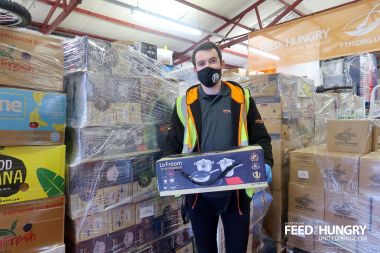Is more money always better? Reflecting Jesus' heart in foreign aid

Last night senior climate change advisors warned Boris Johnson against the government's plan to introduce further cuts to foreign aid next week. They argue that further cuts undermine the UK's role as a trusted partner and will sabotage negotiations at COP26 next week. These concerns are serious. As we continue to see the deepening needs around the world, our response as a nation must remain at the forefront of our minds.
The £4 billion of cuts we have already seen were characterised as 'inhumane', 'immoral', 'unethical'. Less money means less children fed, fewer families lifted out of poverty, more preventable deaths. As Christians we were heartbroken by this apparent lack of compassion for those in such desperate need and we need to continue to hold our leaders them to account. It is essential that we actively pursue being a trusted, compassionate member of the international community.
But, as we see the different needs of communities around the world, I find myself asking, is it really it as simple as putting more money into financial aid?
There is no question that the decision to provide less foreign aid is incredibly costly for millions across the world. As the UK director of Feed The Hungry, an international aid charity, I have no hesitation in adding my voice to the thousands horrified by the cuts. But it is also an easy decision to oversimplify: more money is better, less money is worse. But in reality, providing aid and alleviating poverty are far more complicated.
Money spent on 'foreign aid' doesn't necessarily mean money spent well. You can pour in resources and still fall short of making a real difference. We are called in the Bible to care for societies most vulnerable, to give to the poor and we follow a God that deeply loves the people he has made. So what does it look like to truly love and serve those who are suffering?
The most effective way to explain true aid is to take you to the streets of La Paz, the capital of Bolivia, to the story of Isaac.
Picture the scene. Kids everywhere. Walking down the street you can't help but see them; on benches, in doorways, standing by shop windows. Vacant-eyed. The heady fumes of glue that cling to their clothes. Self-medicating to mask their hunger. Trying to obliterate the fact they are lost, trying to forget.
This is the sight that met Isaac's eyes the first time he visited La Paz. He was overwhelmed by the anguish he saw.
It is estimated that 40 million children live on the streets of South America, and Bolivia, with the continent's highest income inequality, is estimated to have several hundred thousand sleeping rough. From official surveys 80% of street kids inhale glue and many young girls turn to prostitution by 12 to 13 or younger.
Through Alani, Isaac's Bolivian wife, and by visiting the country over many years, Isaac began to better understand the sight that moved him on his first visit. He listened to the childrens' stories. Some fled physical abuse, some mental abuse, while others had been orphaned or abandoned by their parents.
The Bolivian government distinguishes between 'children on the street' who have homes to return to and 'children of the street' who have nowhere left to go. Whilst the needs of both groups are huge, it was the 'children of the street' Isaac felt particularly called to help.
So much of the suffering Isaac witnessed was bound up in the children's environment. How can you fight addiction surrounded by addicts, or find value and hope in an environment where you are akin to dogs and rats?
As he considered how best to respond to the need he saw, he was struck by the old African proverb "it takes a village to raise a child". These children needed more than just a meal on the table. They needed nurture, security and community; they needed a home. A place where they could come to know their value as children created in God's image.
Isaac, supported by Feed The Hungry, developed a plan for a small village with households of four to five street children and a 'parent' figure. All they needed was a site and the Lord provided a plot on the edge of a national park. Backed by a picturesque waterfall with a school and medical centre nearby, it was the perfect place for these children, not just to survive but to thrive.
As a charity, we work in many countries across the world, and one thing is absolutely clear - there is no one size fits all. You can't swoop in with pre-conceptions and a ready-made package of how to meet the needs. You see this throughout Jesus' ministry. He responds to the needs and questions of the people he meets. He sees the physical hunger of the five thousand and provides food for them. He sees the pain of the woman at the well and he offers her true satisfaction. He asks questions, he listens and he responds.
Isaac took time to listen and to understand the specific needs of the street children, before beginning to plan and this transformed his approach to aid.
Many think that the first step in serving is to go, but that is not the case. The first step is to listen. To ask what the need is and to respond.
It is this attitude that needs to be applied to our foreign aid as a nation if we are truly going to be a trusted and compassionate partner to vulnerable communities across the globe. But it also applies to our own giving and service. Our challenge is to follow in Jesus' footsteps. To stop, to ask and to listen. Only then can we step out and serve.
Gwyn Williams has been UK Operations Director for Feed the Hungry for the last 10 years.











